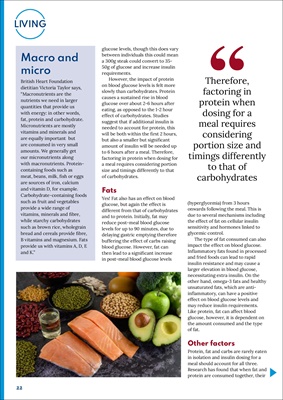
22
LIVING
(hyperglycemia) from 3 hours
onwards following the meal. This is
due to several mechanisms including
the effect of fat on cellular insulin
sensitivity and hormones linked to
glycemic control.
The type of fat consumed can also
impact the effect on blood glucose.
Inflammatory fats found in processed
and fried foods can lead to rapid
insulin resistance and may cause a
larger elevation in blood glucose,
necessitating extra insulin. On the
other hand, omega-3 fats and healthy
unsaturated fats, which are antiinflammatory,
can have a positive
effect on blood glucose levels and
may reduce insulin requirements.
Like protein, fat can affect blood
glucose, however, it is dependent on
the amount consumed and the type
of fat.
Other factors
Protein, fat and carbs are rarely eaten
in isolation and insulin dosing for a
meal should account for all three.
Research has found that when fat and
protein are consumed together, their
Macro and
micro
British Heart Foundation
dietitian Victoria Taylor says,
"Macronutrients are the
nutrients we need in larger
quantities that provide us
with energy: in other words,
fat, protein and carbohydrate.
Micronutrients are mostly
vitamins and minerals and
are equally important but
are consumed in very small
amounts. We generally get
our micronutrients along
with macronutrients. Proteincontaining
foods such as
meat, beans, milk, fish or eggs
are sources of iron, calcium
and vitamin D, for example.
Carbohydrate-containing foods
such as fruit and vegetables
provide a wide range of
vitamins, minerals and fibre,
while starchy carbohydrates
such as brown rice, wholegrain
bread and cereals provide fibre,
B vitamins and magnesium. Fats
provide us with vitamins A, D, E
and K."
glucose levels, though this does vary
between individuals this could mean
a 300g steak could convert to 35-
50g of glucose and increase insulin
requirements.
However, the impact of protein
on blood glucose levels is felt more
slowly than carbohydrates. Protein
causes a sustained rise in blood
glucose over about 2-6 hours after
eating, as opposed to the 1-2 hour
effect of carbohydrates. Studies
suggest that if additional insulin is
needed to account for protein, this
will be both within the first 2 hours,
but also a smaller but significant
amount of insulin will be needed up
to 6 hours after a meal. Therefore,
factoring in protein when dosing for
a meal requires considering portion
size and timings differently to that
of carbohydrates.
Fats
Yes! Fat also has an effect on blood
glucose, but again the effect is
different from that of carbohydrates
and to protein. Initially, fat may
reduce post-meal blood glucose
levels for up to 90 minutes, due to
delaying gastric emptying therefore
buffering the effect of carbs raising
blood glucose. However, fat can
then lead to a significant increase
in post-meal blood glucose levels
Therefore,
factoring in
protein when
dosing for a
meal requires
considering
portion size and
timings differently
to that of
carbohydrates